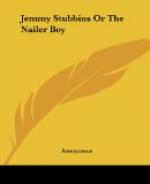all his children to school; if they could not read,
they would be poor, even if they should come to own
parks and carriages, he could not bear to see them
growing up with no books in their hands. He worked
long at the anvil as it was; and he was willing to
work longer and harder to pay the schoolmaster for
teaching his children to read. Josiah was now
ten years old; he had been a faithful boy; he had
made nails ever since he could hold a hammer; and
it was for this that he desired the more to send him
to school. It had troubled him much all along
that the boy was working so long and so well at the
anvil, without having any of his wages to pay the
schoolmaster for teaching him something that would
make him rich in his poverty when he came to be a
man; and he had tried to make up this to him in a
little way, by reading to him easy verses from the
Testament, many of which he had learned by heart.
Besides this, he had bought a little picture-reading-book,
since I was with them last, and Josiah could master
many easy words in it; for he had learned almost all
the letters. But he knew this was a slow way of
getting on, although he feared it was the best he
could do for him. He knew not how he could manage
to spare him for the winter. He had no other boy;
there was a baby in the cradle only a fortnight old,
which made him five children under ten years of age,
to be fed, warmed and clothed through the winter months.
Here he fell into a calculation of this kind—he
could now earn nine shillings, or about two dollars
and twenty cents, a week. His coal cost him three
shillings a week, and his house-rent two; leaving
him but
four shillings a week for a family of
seven persons to live upon. Josiah’s clothes
were well nigh gone; they were indeed ragged; there
was nothing left to sew patches to; and all he had
in the world was on him, except a smock frock which
he put on over them on the Sabbath.
These considerations gave a thoughtful tone to the
nailer’s voice as they came upon his mind, and
a thoughtful air came over the family group when he
had finished, and they all looked straitly into the
fire as much as to say, “It cannot be done.”
So I began at the bacon to soften down these obstacles—there
were nearly 150 pounds of it, besides a spare-rib
hanging from another joist—and suggested
how much better off they were than ten thousands of
poor people in the world. Could they ever spare
Josiah better than during this winter? He would
learn faster now than when he was older, and when
they could not spare him so well. Nor was this
all; if they could get on without him for a few months,
he might not only learn to read without spelling,
but he could teach his three little sisters to read
during the winter nights, and the baby, too, as soon
as it could talk; so that sending him to school now,
would be like sending all his children to the same
school. Yes, it might be more than this.
Let him go for a few months, and when he came back




